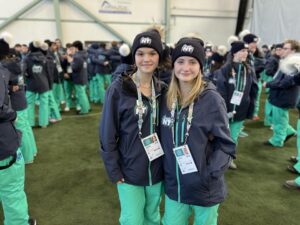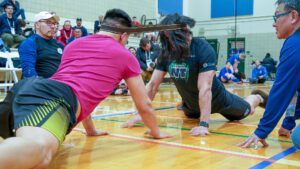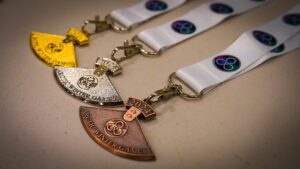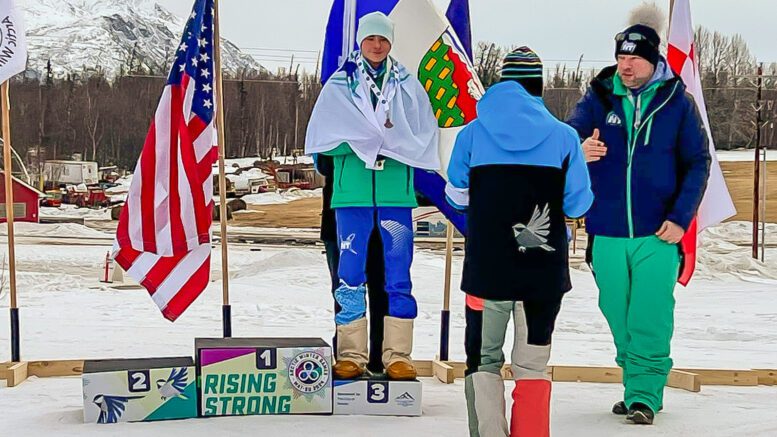Arctic sports highlight the ingenuity, endurance and fortitude of Indigenous sportsmanship and are an important part of the Inuit way of life.
Some events include the One-Foot High Kick, Two-Foot High Kick, Alaskan High Kick, Kneel Jump, Sledge Jump, Triple Jump, Arm Pull, Airplane, One Hand Reach, Head Pull and Knuckle Hop.
 At the 2024 edition of the Arctic Winter Games at Alaska’s Mat-Su Valley, north of Anchorage, Team NT is determined to beat their personal bests and most importantly, help others along the way.
At the 2024 edition of the Arctic Winter Games at Alaska’s Mat-Su Valley, north of Anchorage, Team NT is determined to beat their personal bests and most importantly, help others along the way.
Billie Lennie has been advocating for the sport for 30 years.
Lennie is also the coach for the junior females.
CKLB Reporter Mariah Caruso is on assignment at the Games spoke with coach Lennie on her experience with the sport, how she’s finding Alaska and the dynamic of the team.
MARIA: “Tell me something about the sports that maybe others wouldn’t know what’s so special about Arctic sports.”
BILLIE: “I think one of the unique aspects of the Arctic sports is how everybody helps each other. They’re not all competing, and they’re not in opposition. They’re trying their best. You always see other athletes helping everybody, no matter which team they’re on. They go up and give them tips, and everybody just wants everybody to do their best. I love that.”
MARIA: “Not a lot of sport has that element to it. How long have you been coaching?”
BILLIE: “I’ve been involved with a northern game society in Inuvik for about 30 years. I’m not always coaching. I’m mostly officiating, or organizing.”
MARIA: “Tell me something maybe that others wouldn’t know about the physicality of the sport, what it takes to move your body in this in this way.”
BILLIE: “It takes a lot of focus, it takes a lot of practice. Even just doing a one foot high kick. To tell your brain, you’re going to kick with this one foot and land on that. It takes a lot to train yourself to do that.
MARIA: “Tell me something special about maybe the girls, you’ve been coaching, how are they?
BILLIE: “Some of them are really nervous, but I’m just proud of them because they’re still trying. And they’re just having a lot of fun. Coming from some of the smaller communities, this is huge.
“Kids in the smaller communities, they don’t always get opportunities to travel. So, this is huge, and the communities are always such a big support for them.
“Sometimes they even give extra money for them to have spending money to make sure that they’re gonna have a positive experience. It’s awesome.
MARIA: “Is there anything you want to add that you feel is important?”
BILLIE: “I think teaching the kids how to show respect, how to have respect, t is one of the biggest things we push with our kids. Even though you might be the best, you don’t have to have an (overly) proud ego, or an attitude. We try and have a humble attitude and realize that next year, maybe someone’s gonna beat your record.
“A lot of it is just personal growth. So, I think that’s a big part of it.
 That was coach Billie Lennie speaking with Reporter Mariah Caruso up in Alaska at the Arctic Winter Games.
That was coach Billie Lennie speaking with Reporter Mariah Caruso up in Alaska at the Arctic Winter Games.
Thirteen-year-old Elliot Fast of Yellowknife, won a bronze ulu in the 2.5-kilometre snowshoeing short course.
He said the sport is a lot harder than it looks, but all the tough training provides an overall level of fitness that can be applied to other sports. He called it, “a good hobby to have and it comes with the health benefits.”
Maria asked him his thoughts about landing a medal in his first Games.
“I feel pretty happy. I hoped that I would win a medal as I trained a lot in the months coming up to the games. And did pretty well in tryouts.”
MARIA: “What would you say is something most people don’t know about snowshoeing?”
ELLIOT: “It’s harder than it looks. A lot of people say that snowshoeing is a sport that people go compete in because they can’t make it for any other sports in our community. But it’s a lot harder than you think. The snowshoes are about a pound each and they’re pretty wide so you have to run with a lot wider stance, which makes things significantly harder.”
Approximately 350 NWT athletes, cultural participants, coaches, managers and support are in Alaska for the Games this week.
Stay tuned to CKLB 101.9 FM for more Arctic Winter Games coverage, with reporter Mariah Caruso following Team NT throughout the competition.
Maria’s also posting photos and videos to CKLB’s new community Facebook page, called The Voice of Denendeh.

As of first thing Wednesday morning, Team NT resided in third place with eight gold, 11 silver and six bronze ulus. Alaska was in first place with 54 podium places and Yukon was second with 34 in total.
— Article compiled by James O’Connor





